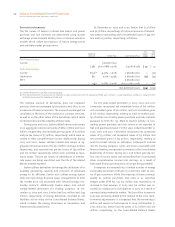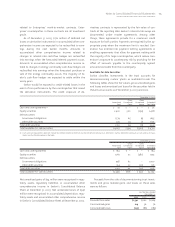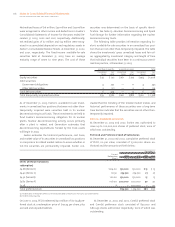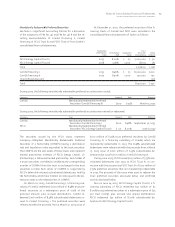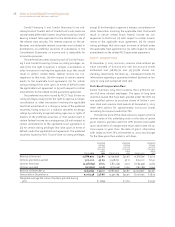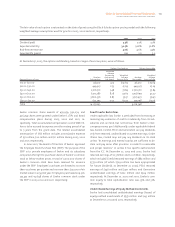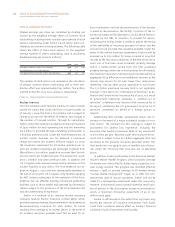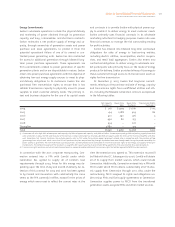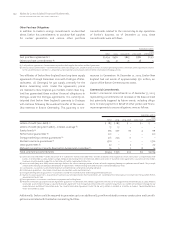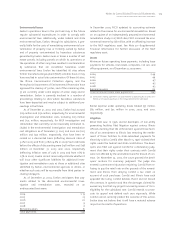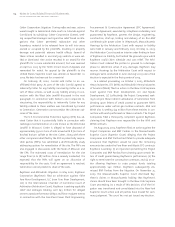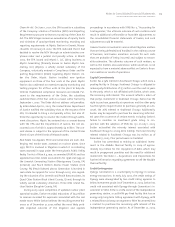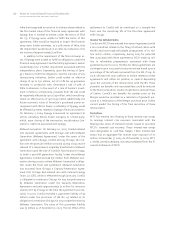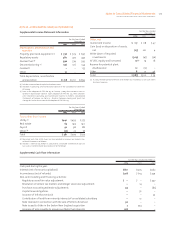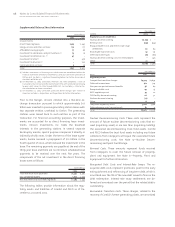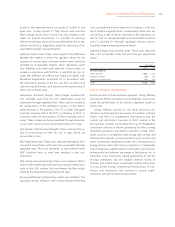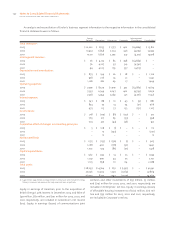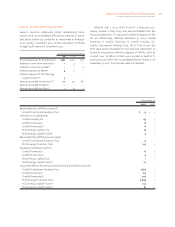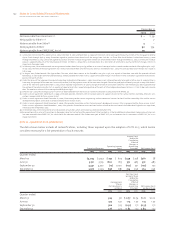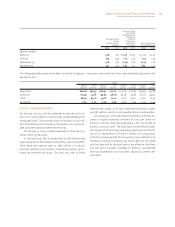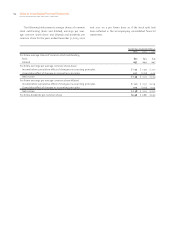ComEd 2003 Annual Report Download - page 126
Download and view the complete annual report
Please find page 126 of the 2003 ComEd annual report below. You can navigate through the pages in the report by either clicking on the pages listed below, or by using the keyword search tool below to find specific information within the annual report.124 Notes to Consolidated Financial Statements
EXELON CORPORATION AND SUBSIDIARY COMPANIES
Cotter Corporation Litigation. During 1989 and 1991, actions
were brought in Federal and state courts in Colorado against
ComEd and its subsidiary, Cotter Corporation (Cotter), seek-
ing unspecified damages and injunctive relief based on alle-
gations that Cotter permitted radioactive and other
hazardous material to be released from its mill into areas
owned or occupied by the plaintiffs, resulting in property
damage and potential adverse health effects. Several of
these actions resulted in nominal jury verdicts or were set-
tled or dismissed. One action resulted in an award for the
plaintiffs for a more substantial amount, but was reversed
on April 22, 2003 by the Tenth Circuit Court of Appeals and
remanded for retrial. An appeal by the plaintiffs to the
United States Supreme Court was denied on November 10,
2003. No date has been set for a new trial.
On February 18, 2000, ComEd sold Cotter to an un-
affiliated third party. As part of the sale, ComEd agreed to
indemnify Cotter for any liability incurred by Cotter as a re-
sult of these actions, as well as any liability arising in con-
nection with the West Lake Landfill discussed in the next
paragraph. In connection with Exelon’s 2001 corporate re-
structuring, the responsibility to indemnify Cotter for any
liability related to these matters was transferred by ComEd
to Generation. Generation cannot predict the ultimate out-
come of the cases.
The U.S. Environmental Protection Agency (EPA) has ad-
vised Cotter that it is potentially liable in connection with
radiological contamination at a site known as the West Lake
Landfill in Missouri. Cotter is alleged to have disposed of
approximately 39,000 tons of soils mixed with 8,700 tons of
leached barium sulfate at the site. Cotter, along with three
other companies identified by the EPA as potentially respon-
sible parties (PRPs), has submitted a draft feasibility study
addressing options for remediation of the site. The PRPs are
also engaged in discussions with the State of Missouri and
the EPA. The estimated costs of remediation for the site
range from $0 to $87 million. Once a remedy is selected, it is
expected that the PRPs will agree on an allocation of
responsibility for the costs. Until an agreement is reached,
Generation cannot predict its share of the costs.
Raytheon and Mitsubishi Litigation. In May 2002, Raytheon
Corporation (Raytheon) filed an arbitration against Sithe
Fore River Development, LLC (now Fore River Development,
LLC) in the International Chamber of Commerce Court of
Arbitration (Arbitration Court). Raytheon is seeking equitable
relief and damages totaling over $45 million for alleged
owner-caused performance delays and force majuere events
in connection with the Fore River Power Plant Engineering,
Procurement & Construction Agreement (EPC Agreement).
The EPC Agreement, executed by a Raytheon subsidiary and
guaranteed by Raytheon, governs the design, engineering,
construction, start-up, testing and delivery of an 800-MW
combined-cycle power plant in Weymouth, Massachusetts.
Hearings by the Arbitration Court with respect to liability
were held in January and February 2003. On May 12, 2003,
the Arbitration Court issued an interim order finding in favor
of Raytheon on liability, but limited the grounds upon which
Raytheon could claim schedule and cost relief. The Arbi-
tration Court ordered the parties to proceed to a damages
phase to determine what, if any, damages Raytheon may
recover. Hearings by the Arbitration Court with respect to
damages were conducted in June and July 2003 and a final
decision is expected in the first quarter of 2004.
In a related proceeding, on October 2, 2003, Mitsubishi
Heavy Industries, LTD (MHI) and Mitsubishi Heavy Industries
of America (MHIA) filed an action in the New York Supreme
Court against Fore River Development, LLC and Mystic
Development, LLC (collectively, the Project Companies) seek-
ing to enjoin these indirect subsidiaries of Generation from
drawing upon letters of credit posted to guarantee MHI’s
performance under certain gas turbine contracts. MHI and
MHIA also is seeking $34 million from these entities in con-
nection with work performed on these contracts. The Project
Companies filed a third-party complaint against Raytheon,
claiming that Raytheon was responsible for the MHI and
MHIA contracts.
On August 29, 2003, Raytheon filed an action against the
Project Companies and BNP Paribas in the Massachusetts
Superior Court (Superior Court) alleging that the Project
Companies and BNP Paribas had failed to provide adequate
assurance that Raytheon would be paid the remaining
amounts due under the Fore River and Mystic EPC contracts.
Raytheon is seeking: (1) an injunction preventing the Project
Companies and BNP Paribas from drawing upon certain let-
ters of credit guaranteeing Raytheon’s performance; (2) the
right to terminate the construction contracts; and (3) an or-
der allowing Raytheon to seize project funds totaling
approximately $40 million. Raytheon subsequently dis-
missed BNP Paribas from the litigation. On November 25,
2003, the Massachusetts Superior Court dismissed Ray-
theon’s claims in Massachusetts holding that Raytheon’s
claims should have been brought in the New York Supreme
Court proceeding. As a result of this decision, all of the liti-
gation was transferred and consolidated into the New York
Supreme Court action and all parties have moved for sum-
mary judgment. The court has not yet issued any decision.


